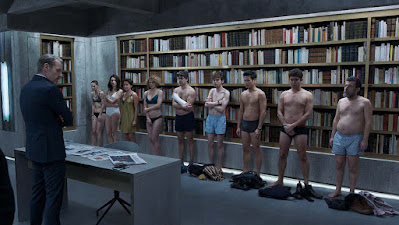Ok, so this one's a little different. I saw some of these in the cinema before lockdown and a few after. Most, I saw as part of a VoD service. While I adapted to this and found it a pretty good way to do a 31 nights of horror in October I probably had more enjoyment programming a kind of online SHADOWS using the VoDs and Messenger for running discussion. We went through some fine movies and it was enjoyable having Friday night become cinematic again. And in the circumstances, with multi-voiced commentary happening in the chatroom I didn't have to tell anyone to shush once. These below were offered new in my neck o' the woods in 2020 and this is what I think of them.
High
Possessor - Antiviral wasn't a fluke, it was a stretching exercise. Possessor reveals a Cronenberg Jr who will go where his father went and maybe further. One to watch for strong sci-horror concepts and managed to make a kind of Inception that was as deep but hours shorter. Movie of the Year.
The Translators - Taut and convoluted thriller wisely plays things serious so it can be enjoyed. Literature vs the publishing industry with massive global stakes. Well judged writing and expert casting make everything work.
Invisible Man - Leigh Wannell managed to surprise me with this stark take on an old tale that called upon the depths of its cast's powers and some genuinely tough thinking about the issue of domestic violence.
The Witch in the Window - Had heard this was a kind of Hallmark horror and so avoided it until it served as a plug in my 31 Nights in October. Nope, not Hallmark but a highly effective haunted house story with depth and development and a crushing conclusion. A new horror favourite.
Host - What to do in lockdown? Make a movie about being in lockdown and run it for the limits of a normal Zoom meeting. Everyone's on board in their own spaces and cannot physically save anyone else. Strayed a little too far into literalism but worked until the end.
The Vast of Night - How to make yet another alien invasion movie? Set it in the 50s before the mythology was too well drafted and make it about personal accounts and the act of listening. A sci-fi gem about witness.
Women Make Film - Epic trek through cinema history that puts its lessons where its mouth is, narrated by and featuring only the work of women film directors. Never lagged or disappointed over its eighteen hour screen time.
The Trouble With Being Born - Unnerving tale of memory using a learning android as the central character puts A.I. to shame through its refusal to sentimentalise. Forces searching questions from the viewer by making them fill the silence with their own discoveries.
The Lighthouse - Wasted lives duke it out in a phallic retreat. What is the cost? What is the prize. Much better than the director's debut The Witch.
Relic - Atmospheric fable of hereditary dementia told with convincing horror overtones. Central scene involving the corridors of the house still haunting.
Middle
Freaky - Freaky Friday the 13th. A passable effort from Blumhouse and the writer/director who brought us the dizzy and wonderful Happy Death Day. Horror side could have been more threatening. Comedy side could have been darker.
Shirley - Left turn from normal biopic focuses on issues that the subject might illustrate something about the creative process. Shirley Jackson lives in a Edward Albee style marriage that allows the colonisation of younger couples. That Jackson gets a book out of it without naming or even suggesting the title is to the film's credit and Elizabeth Moss is her usual committed self in the title role. Nevertheless, it didn't quite haunt me the way I wanted it to.
She Dies Tomorrow - Nice idea about contagious despair but doesn't travel quite far enough from its presence to warrant feature length.
Bombshell - Strong relating of corporate rebellion as significant female anchors and tv editorialists push back at hostile boss culture. Wish it had ventured into satire as its insistence on a movie of the week straightness works against it, despite some power in passing scenes.
Mank - Terrific performance by Gary Oldman in the title role as a writer threatened with professional extinction by the gods of media pens the screenplay of one of the most revered films in history. Sticks to a flawed reading of history but makes a stronger character piece for all that. Reminded me of Salieri in Amadeus telling his warped side of the story of Mozart.
1917 - Outstanding achievement buoyed by a solid central performance can't quite rise above a first person shooter feel.
Low
I See You - Invasion by stealth horror tale builds well before revealing the mundanity of its secret.
Colour Out of Space - Ragin' Nick Cage roars through this well meaning attempt at a Lovecraft classic but the problem is lacklustre conception and the overlong running time that gives the sense of treading water rather than building tension.
The Hunt - Sleazy political comedy claims balance by making the rightwingers all disenfranchised rednecks and the liberals button pushing illuminati. Nice try, Snowball.



